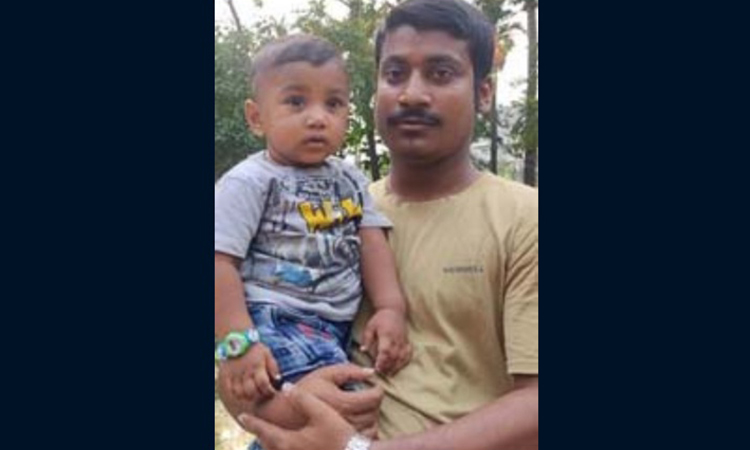News Flash

By Ismail Ahsan
DHAKA, May 31, 2025 (BSS) – Born into hardship and raised by a single mother, 32-year-old Rana Talukder, who dreamed of lifting his family from poverty, was shot dead during the victory rally of July uprising in Uttara, leaving behind a widowed wife, a toddler son, and a mother —now forced to mourn the son who once promised them a life of dignity.
“Ma, our days of sorrow are over. You won’t have to work in other people’s houses anymore,” Rana told his mother on the afternoon of August 5, his voice trembling with excitement after hearing the news of Hasina’s resignation and joined a victory rally near Uttara East Police Station—only to be shot dead on the spot by police bullets.
Talking to BSS, Rana’s mother Ruby Begum (60) said, “On August 5, Rana watched TV news that changed his tone. He said, ‘Ma, our sorrow is over. You won’t have to work in other people’s houses anymore.’
Later that day, Rana joined a victory rally in front of Uttara East Police Station.
“There, police opened fire on the jubilant crowd. Rana was shot in the head. He died instantly. His family never saw him alive again,” she said.
“My boy grew up with hardship in his bones,” said Ruby Begum, her voice cracking with grief. “Rana’s father died when he was only five. I raised my children doing housework in other people’s homes. I thought maybe the time had come for a little comfort.”
She recalled the details of that fateful day from her modest rented home in South Azampur Jamtola, Dakshinkhan. “We had lunch together. He saw the news, stood up, and said, ‘Ma, I will go bring food home, you just rest today.’ That was the last time I saw him walk out the door.”
When evening came and Rana hadn’t returned, his wife grew worried. Ruby and her elder daughter-in-law began searching for him. “We couldn’t reach his phone. I called my elder son—he said they were both near Uttara East Thana. When we arrived, the area was chaotic. Fires burned, and it was impossible to go further.”
She found her elder son but not Rana. “I asked, ‘Where’s your brother?’ He said, ‘He’s right here.’ I told him, ‘Bring him to me.’ Just then, as they tried to cross the gate, bullets came from nowhere. Three or four bullets hit Rana in the head.”
Ruby ran toward her son. “He was lying face down. I held his head—it was still warm, soaked in blood. My fingers sank into the wound. He was already gone.”
They rushed his body to Bangladesh Medical, hoping for a miracle. None came. “He died there. Tell me, how does a mother live with that?”
Rana now lies buried in a mass graveyard in Dakshinkhan, his final resting place marked by a red and green flag—placed by friends who saw him not just as a victim, but a martyr.
“People come to visit, they see his grave, and wipe away their tears,” Ruby said.
“They all ask the same question—why were so many died in Uttara after the victory?”
According to the July Revolutionary Alliance, a student-led group documenting the post-protest crackdown, over 50 people were killed in Uttara alone on August 5. Hundreds more were injured.
“And these are only confirmed numbers,” said Saleh Mahmud Rayhan, a private university student and the alliance’s convener.
“We believe the death toll is much higher. Many bodies have disappeared. We are working on the ground to document them.”
Back in the grieving household, Rana’s wife Ranu (24) tried to hold her composure. “He was with us that morning, playing with our 2.5-year-old son, Meheraz. Maybe he felt it coming. That morning, when I scolded our son, he told me, ‘We grew up fatherless, kicked and cursed. If I die, will my son face the same?’”
Now, their child is left with only memories—vague, silent, and blood-soaked. “He doesn’t understand much,” Ranu said. “But he saw his father’s body, the blood, the bullets. Now he just says, ‘Baba is dead.’ How do I explain this to him when he grows up? What do I say when he asks, ‘Where is my father?’”
She broke down, recalling how Rana used to call from work. “Every day, he would ask, ‘How’s Babu? Did you eat? How’s Ma?’ That number hasn’t called since August 5. It never will.”
The couple had waited nine years for a child. “He was our treasure,” said Ranu. “We had dreams. Rana used to say, ‘We couldn’t study because of poverty. But now, I’ll send my son to become a Hafiz, a good man, a scholar.
’ And now? He left that child behind. In this city, we have no one. No place to go.”
Rana’s sister, Aklima (20), has not spoken a word since her brother’s death. “We keep asking her to speak,” Ruby said. “But she just stares. She can’t even cry anymore.”